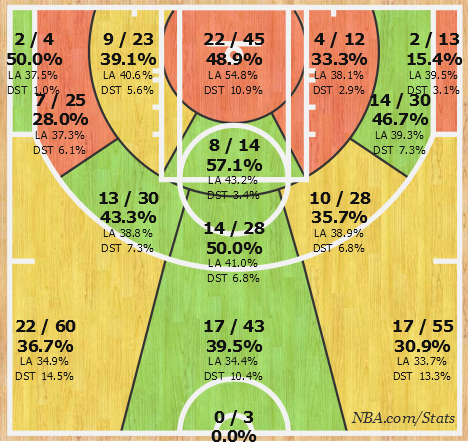Check out the entire report cards over at QCH, as they are running one for each player on the Hornets over the course of the off-season.
Name: Mo Williams
Position: Point Guard
Team: Charlotte Hornets
2014-15 Grade: B
The move to acquire Mo Williams halfway through the 2014-15
season was one made out of necessity. The Hornets lost their starting point
guard and go-to scorer, Kemba Walker, right in the midst of a tight Eastern
Conference playoff push, and without a legitimate full-time fill-in on the
roster things looked grim.
Enter: Mo Williams.
Williams was added near the deadline as sort of a stop-gap
measure. The organization hoped that he could serve as a solid enough
replacement for their prized player, and at least help to keep the team afloat
in the East while Walker was on the mend. Williams and Walker play a similar
style – both undersized scoring guards – so the move made some solid sense, and
it worked well, at first.
The Hornets went on a five-game winning streak shortly after
Williams’ arrival in the Queen City, and Williams carried a big load on the
offensive end initially. But as the season wore on, inconsistency set it.
Williams shifted to the bench when Walker returned, and the Hornets struggled,
dropping 7 out of their last 8 games and missing out on the playoffs; something
hyper-competitive owner Michael Jordan was probably not too happy about,
especially on the heels of the team’s playoff appearance last season.
Williams performed much better in his first 14 games as a
starter (19.8 ppg, 43% from the field), than he did in the final 13 in a
reserve role (14.5 ppg, 34% from the field). The twelve-year veteran is an
unrestricted free agent this summer, making his future in Charlotte uncertain
to say the least.
 |
| Image via usatoday.com |
Strengths: Mo can
score. Quite simply his biggest asset to a team is his ability to put the ball
in the basket from the guard position. His ability to score is why he has been
able to last so long in the league, despite being bounced around – he has
played on seven different teams – and that is why he was brought to Charlotte. In
that regard, he didn’t disappoint.
In his 27 games with the Hornets, Williams averaged 17.2
points per game, good for the second highest average on the entire team, behind
only Walker’s 17.3 points per. He has the ability to score in a variety of
ways, as he can penetrate into the paint or pull-up from beyond the arc. His
ability to hit three-point shots was a help for the Hornets, as it allowed them
to stretch the floor in the absence of any other reliable long-distance
options. Charlotte was 25th league-wide in three’s made per game
with only 6.1, and Williams connected on 2.2 of those per game during his time
with the team. This helped him to keep opposing defenses on their heels and in
turn opened up opportunities for teammates.
Although he is mainly known as a scorer, Williams is also a
decent distributor. He has a respectable career average of five assists per
game, and he improved upon that number during his stint in Charlotte. His
average of six assists per game with the Hornets led the entire team. Second
was Walker with 5.1 per contest. The Hornets weren’t exactly bursting with
offensive options, but Williams made the most out of it. In his 27 games with
the team, Williams became their second leading scorer, and leading assist man
on the season; not too bad.
Weaknesses: You
know that saying ‘you can’t teach an old dog new tricks’? Well, that pretty
aptly applies to Mo Williams. After twelve seasons and seven franchises, you
pretty much know what you’re going to get with Williams, both good and bad.
While Williams is a solid scorer, he is far from an
efficient one. During his time with the Hornets last season, he shot only 39%
from the field, despite taking over 15 shots per game. While he shot 33% from
three-point range, he posted an effective field goal % of only 46. He is a
high-volume scorer, meaning he needs the ball in his hands and needs plenty of
opportunities to produce. He might put up 30 points, but it is going to take 25
shots, and while that may work on an individual game basis, overall it is not
great for the flow of an offense, especially from the point guard position. His
usage percentage with the Hornets was a whopping 28.8 – on par with guys like
Stephen Curry and Kevin Durant. In short, Williams is going to put up points,
but he is going to eat up an offense doing it; think of a less dynamic and
tenacious Allen Iverson.
Aside from straight ahead, where Williams likes to operate
from, he didn’t shoot especially well from anywhere in the field with the
Hornets, and actually shot below the league average right around the rim:
Williams was also never the best defender. When he was
younger at least he had quickness, but at this point he is often a liability at
that end, especially when matched up against some of the league’s elite young
guards like Curry, Russell Westbrook, or Kyrie Irving. With mounting injury issues,
Williams’ defensive lapses became difficult to recover from at times, and that
put a lot of pressure on the Hornets defense. It is safe to say that no one
interested in Mo Williams’ services at this point in his career want him for
his defensive ability.
Check out the rest of the report card, including reasons for optimism/pessimism here.

No comments:
Post a Comment